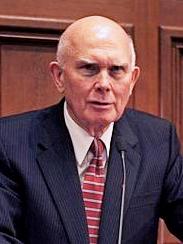
Dallin Harris Oaks is an American religious leader and former jurist and academic who since 2018 has been the first counselor in the First Presidency of the Church of Jesus Christ of Latter-day Saints. He was called as a member of the church's Quorum of the Twelve Apostles in 1984. Currently, he is the second most senior apostle by years of service and is the President of the Quorum of the Twelve Apostles.
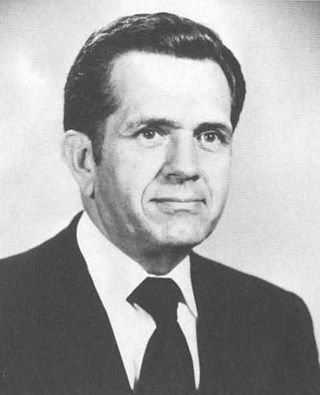
Boyd Kenneth Packer was an American religious leader and educator who served as president of the Quorum of the Twelve Apostles of the Church of Jesus Christ of Latter-day Saints from 2008 until his death. He also served as the quorum's acting president from 1994 to 2008 and was an apostle and member of the Quorum of the Twelve from 1970 until his death. He served as a general authority of the church from 1961 until his death.

Neal Ash Maxwell was an American scholar, educator, and religious leader who served as a member of the Quorum of the Twelve Apostles of the Church of Jesus Christ of Latter-day Saints from 1981 until his death.

Charles William Penrose was a member of the Quorum of the Twelve Apostles of the Church of Jesus Christ of Latter-day Saints from 1904 to 1911. Penrose was also a member of the First Presidency, serving as a counselor to church presidents Joseph F. Smith and Heber J. Grant from 1911 until his death.
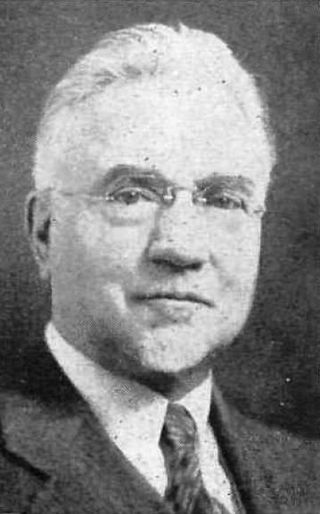
John Andreas Widtsoe was a Norwegian-American scientist, author, and religious leader who was a member of the Quorum of the Twelve Apostles of the Church of Jesus Christ of Latter-day Saints from 1921 until his death in 1952.
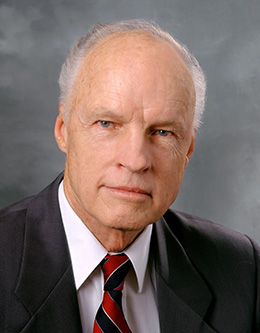
Truman Grant Madsen was a professor of religion and philosophy at Brigham Young University (BYU) and director of the Brigham Young University Jerusalem Center for Near Eastern Studies. He was a prolific author, a recognized authority on Joseph Smith, and a popular lecturer among Latter-day Saints. At one point, Madsen was an instructor at the LDS Institute of Religion in Berkeley, California.
The history of the Latter Day Saint movement includes numerous instances of violence. Mormons faced significant persecution in the early 19th century, including instances of forced displacement and mob violence in Ohio, Missouri, and Illinois. Notably, the founder of Mormonism, Joseph Smith, was shot and killed alongside his brother, Hyrum Smith, in Carthage, Illinois in 1844, while Smith was in jail awaiting trial on charges of treason and inciting a riot.
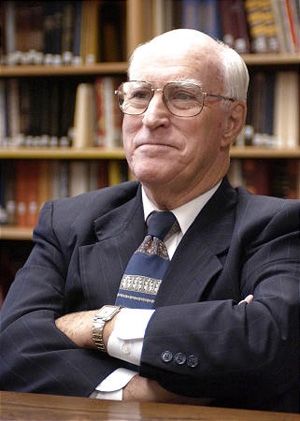
Robert James Matthews was a Latter-day Saint religious educator and scholar, teaching in the departments of Ancient Scripture and Religious Education at Brigham Young University (BYU) in Provo, Utah.
George Wendell Pace was an American professor of religion at Brigham Young University (BYU) in Provo, Utah. He was a popular writer and speaker on religion in The Church of Jesus Christ of Latter-day Saints and part of a public criticism voiced by Apostle Bruce R. McConkie in 1982.
Richard Lloyd Anderson was an American lawyer and theologist of the Church of Jesus Christ of Latter-day Saints who was a professor of church history and doctrine at Brigham Young University (BYU). His book Investigating the Book of Mormon Witnesses is widely considered the definitive work on this subject. Anderson was the brother of Karl Ricks Anderson.
Arnold Kent Garr was the chair of the department of Church History and Doctrine at Brigham Young University (BYU) from 2006 to 2009. He was also the lead editor of the Encyclopedia of Latter-day Saint History.
Richard Eyring "Rick" Turley Jr. is an American historian and genealogist. He previously served as both an Assistant Church Historian of the Church of Jesus Christ of Latter-day Saints and as managing director of the church's public affairs department.
Edward Lawrence Kimball was an American scholar, lawyer, and historian who was a law professor at Brigham Young University (BYU).
Ivan Junius Barrett was an American author, professor, and historian of the Church of Jesus Christ of Latter-day Saints.
Steven Craig Harper is a professor of church history and doctrine at Brigham Young University. He was a historian for the Church History Department of the Church of Jesus Christ of Latter-day Saints. From 2019, he is the Editor-in-Chief of BYU Studies Quarterly.
Gilbert Woodrow Scharffs was a Latter-day Saint religious educator and author.
Tad Richards Callister was the 21st Sunday School General President of the Church of Jesus Christ of Latter-day Saints from 2014 to 2019. He served previously in the church as a general authority from 2008 to 2014, including as a member of the Presidency of the Seventy from 2011 to 2014.
Patricia Terry Holland was an American educator, writer, and religious leader in the Church of Jesus Christ of Latter-day Saints. She was a counselor in the church's Young Women General Presidency from 1984 to 1986. From 1980 to 1989, Holland was "first lady" of Brigham Young University (BYU) where her husband, Jeffrey R. Holland, was president of the institution.
This is a timeline of LGBT Mormon history in the first decade of the 2000s, part of a series of timelines consisting of events, publications, and speeches about LGBTQ+ individuals, topics around sexual orientation and gender minorities, and the community of members of the Church of Jesus Christ of Latter-day Saints.





